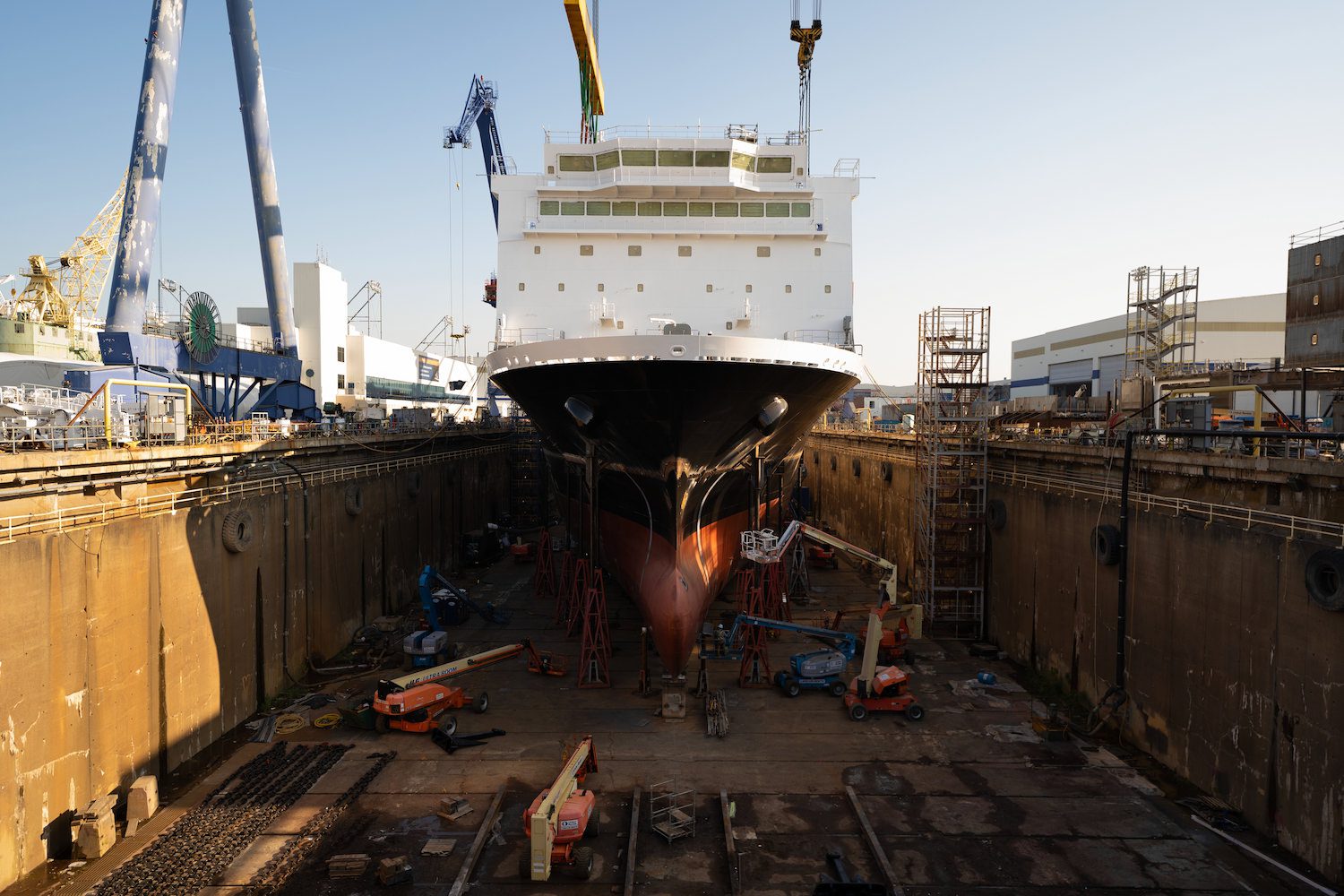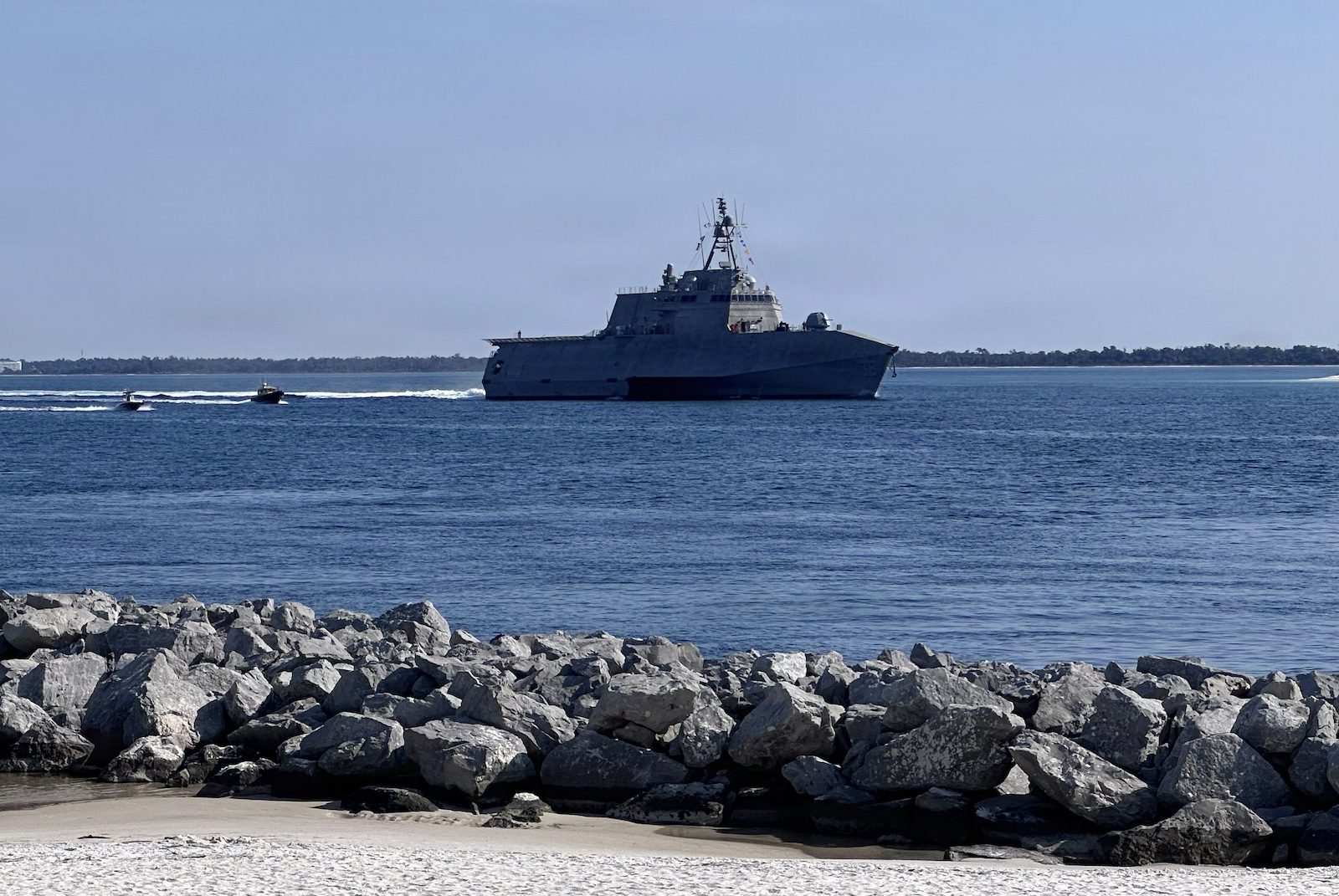Endorsements are flooding in behind the newly reintroduced SHIPS for America Act, bipartisan legislation designed to restore America’s maritime strength and revitalize its shipbuilding industrial base.
With support from virtually every corner of the U.S. maritime sector, the bill is being hailed as the most ambitious maritime policy proposal in decades.
Reintroduced by Senators Mark Kelly (D-AZ) and Todd Young (R-IN), alongside Representatives John Garamendi (D-CA) and Trent Kelly (R-MS), the bill aims to close the yawning gap between the U.S. and China in maritime capacity. Today, only 80 U.S.-flagged ships operate in international commerce, compared to more than 5,500 under China’s flag.
“After decades of dangerously neglecting our shipbuilding industry, we’re finally doing something about it,” said Senator Kelly, a U.S. Navy veteran and the first U.S. Merchant Marine Academy graduate to serve in Congress. “The SHIPS for America Act is the most ambitious effort in a generation to revitalize the U.S. shipbuilding and commercial maritime industries and counter China’s dominance over the oceans.”
Industry Unites Behind Maritime Renewal
Support for the legislation spans shipbuilders, mariner unions, ports, steelmakers, maritime academies, and national security experts. More than 75 organizations have offered full-throated endorsements.
“This bill represents the most comprehensive maritime policy initiative in more than half a century,” said Brian W. Schoeneman, Chair of USA Maritime. “Now, more than ever, the United States needs a strong, vibrant and growing Merchant Marine, capable of carrying a substantial portion of our foreign commerce and supporting our military in time of war.”
The Navy League called the bill “a landmark legislative achievement that will comprehensively meet the needs of the U.S. merchant marine and bolster our shipbuilding industrial base.” CEO Mike Stevens added, “The SHIPS for America Act addresses these vital considerations and reaffirms that America is, and always will be, a maritime nation.”
What’s in the SHIPS for America Act? Key Provisions to Restore U.S. Maritime Power
Former U.S. Coast Guard admirals also weighed in, warning that the U.S. fleet has shrunk to less than one-half of one percent of global shipping and that “our economy, industrial productivity and national security is at risk.”
Shipyards and Suppliers Applaud Investment Incentives
Shipyards large and small are backing the legislation, including General Dynamics NASSCO, Hanwha Philly Shipyard, Senesco Marine, and others.
“This legislation represents a significant step forward in strengthening the nation’s shipyard industrial base,” said Matthew Paxton, President of the Shipbuilders Council of America. “We look forward to collaborating with policymakers to ensure the success of initiatives that secure the future of America’s shipyard industrial base and maritime workforce.”
“This bill would put shipbuilders like NASSCO in a better position for hiring and retaining a steady workforce,” added Dave Carver, President of General Dynamics NASSCO.
David Kim, CEO of Hanwha Philly Shipyard, said the bill offers “tangible incentives” to the domestic maritime industry to expand the U.S. flag ocean-going fleet. “We see tremendous value in this legislation and believe it would have a long-term positive impact,” he said.
The American Shipbuilding Suppliers Association praised the bill’s “elements of Buy America legislation,” with President Roger Camp noting, “We must work with our industrial partners in NATO and Allied nations, but also invest in our American workforce and capabilities.”
Labor Backs Maritime Jobs and National Security
Maritime labor unions offered some of the strongest endorsements yet. Captain Don Josberger, International President of the Masters, Mates & Pilots union, said:
“This comprehensive and pragmatic maritime policy initiative will create and support jobs for American mariners, ensuring that our country has the maritime manpower needed to protect and enhance our nation’s economic and military security.”
David Heindel, President of the Seafarers International Union, added:
“In my 51 years of working in this industry, I have not seen any legislation as comprehensive and impactful as the SHIPS for America Act.”
And from the Marine Engineers’ Beneficial Association:
“This comprehensive legislation will revitalize our merchant marine… and position the United States to compete economically against China,” said MEBA President Adam Vokac.
Maritime Academies Stand United
Every U.S. State Maritime Academy and the U.S. Merchant Marine Academy Alumni Association and Foundation are backing the legislation.
“The SHIPS Act will result in the United States Merchant Marine once again playing a leading role on the global stage,” said the Consortium of State Maritime Academies.
“We are deeply grateful to the sponsors… for recognizing that the USMMA campus at Kings Point, NY… urgently requires modernization,” said Captain James F. Tobin, President of the USMMA Alumni Association and Foundation.
California State Maritime Academy Interim President Michael J. Dumont added:
“The SHIPS for America Act is a critical piece of legislation that will strengthen the U.S. shipbuilding industrial base… and allow the United States to project power at the time and place of our choosing.”
Steelmakers and Terminal Operators Rally Behind the Fleet
The American Iron and Steel Institute, SSAB Americas, and Nucor all endorsed the bill for its potential to generate demand for domestic steel products.
“America’s national security relies on ships built with American steel,” said Kevin Dempsey, AISI President.
“Our members are excited to provide the American-made steel to make our shipbuilding dreams a reality,” added Philip K. Bell, President of the Steel Manufacturers Association.
Carl Bentzel, President of the National Association of Waterfront Employers, praised the bill’s infrastructure incentives:
“Ports and terminal operators across the country are ready to meet the future with modern infrastructure and a highly skilled workforce—but we need a commercial fleet that can match that capability.”
A National Imperative
Support has also come from policy organizations, think tanks, and retired flag officers. Stephen M. Carmel, President of U.S. Marine Management, said:
“This essential legislation sets the policy course upon which we must embark to actually be the world’s foremost maritime power that is our nation’s birthright.”
Vice Admiral William A. Brown (Ret.), President of the NDTA, added:
“Everyone in America needs to get educated about the importance of this bill. Rebuilding our U.S. fleet… is a national imperative.”
Saltchuk—a parent company to TOTE, OSG, and Tropical—said the bill represents “a bold, strategic effort to strengthen our nation’s maritime industry.” Crowley’s Chairman and CEO, Tom Crowley, noted the legislation “thoughtfully addresses many critical challenges facing the U.S. maritime sector.”
What’s in the SHIPS for America Act
The legislation proposes a broad set of reforms and investments, including:
-
- A Maritime Security Advisor in the White House and a Maritime Security Board to coordinate national strategy
-
- A goal of adding 250 U.S.-flagged ships in 10 years via the Strategic Commercial Fleet Program
-
- A 25% investment tax credit for shipyards, a restructured Title XI loan program, and new financial incentives
-
- A Merchant Marine Career Retention Program, recruitment campaign, and upgrades to State Maritime Academies and USMMA
-
- A Rulemaking Committee to modernize commercial maritime regulations and reduce U.S. Coast Guard credentialing red tape
-
- A mandate that government-funded cargo and a portion of Chinese imports move on U.S.-flagged vessels
The bill is expected to be introduced in two parts: the SHIPS for America Act and the Building SHIPS in America Act.
Charting a New Course
“Shipbuilding is a national security priority and a stopgap against foreign threats and coercion,” said Senator Young. “This legislation is critical to our warfighting capabilities and keeping pace with China.”
With broad bipartisan support, endorsements from more than 75 industry stakeholders, and alignment with President Trump’s Executive Order on shipbuilding, the SHIPS for America Act may finally represent the course correction the U.S. maritime sector has long been waiting for.
A full list of endorsing statements can be found here.

 Join The Club
Join The Club











